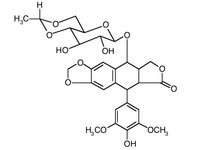Many anticancer drugs fail to live up to their potential simply because they do not dissolve well in water. Only by mixing these fat-soluble compounds in oils, detergents, and other substances that cause unwanted side effects can pharmacologists keep them in the bloodstream long enough to reach the tumor targets.
Now, by adding a phosphate side group to a commonly used anticancer compound called etoposide, researchers have managed to get rid of all other chemical baggage. As a result, cancer specialists can explore different and possibly more effective treatment regimens involving this compound, says Daniel R. Budman of North Shore University Hospital-Cornell Medical College in Manhasset, N.Y. The phosphate imparts a charge to the molecule so that it readily dissolves in water.
Budman and his colleagues administered the water-soluble version to 25 people whose solid tumors had not responded to other treatments. The researchers proved they could deliver the drug faster (in five, instead of 45, minutes) and in higher doses with fewer complications than is possible with etoposide in its original form, says Budman. After injection, enzymes in the blood chop off the compound's phosphate group and, within 10 minutes, restore the drug to its original, active form. "Then it [follows] the same pharmacology as the older drug," Budman explains. "[This form] is a lot more convenient."
The new version must undergo further evaluation, but Budman and others predict that pharmaceutical companies will soon begin making water-soluble versions of other drugs.
COPYRIGHT 1993 Science Service, Inc.
COPYRIGHT 2004 Gale Group



